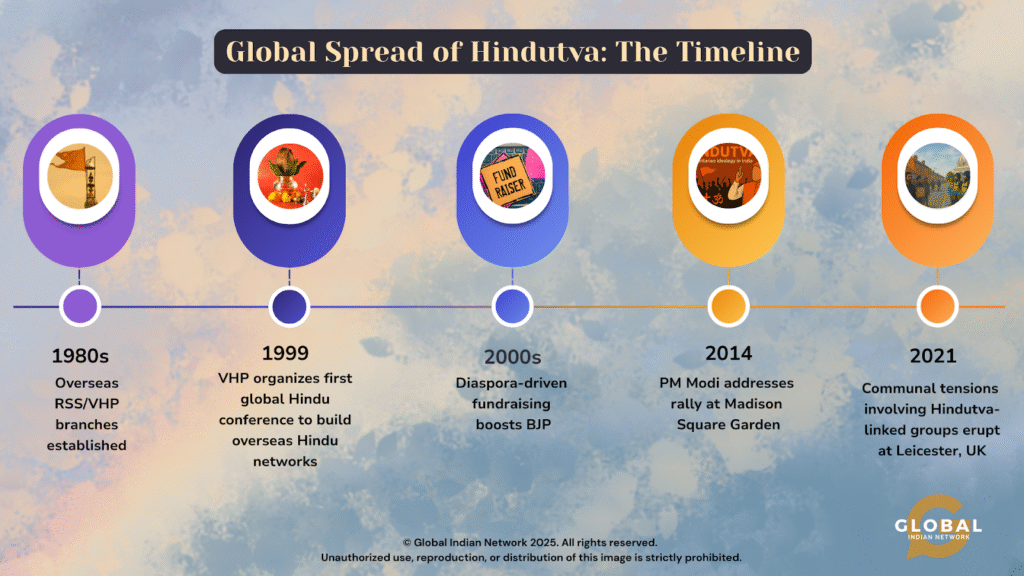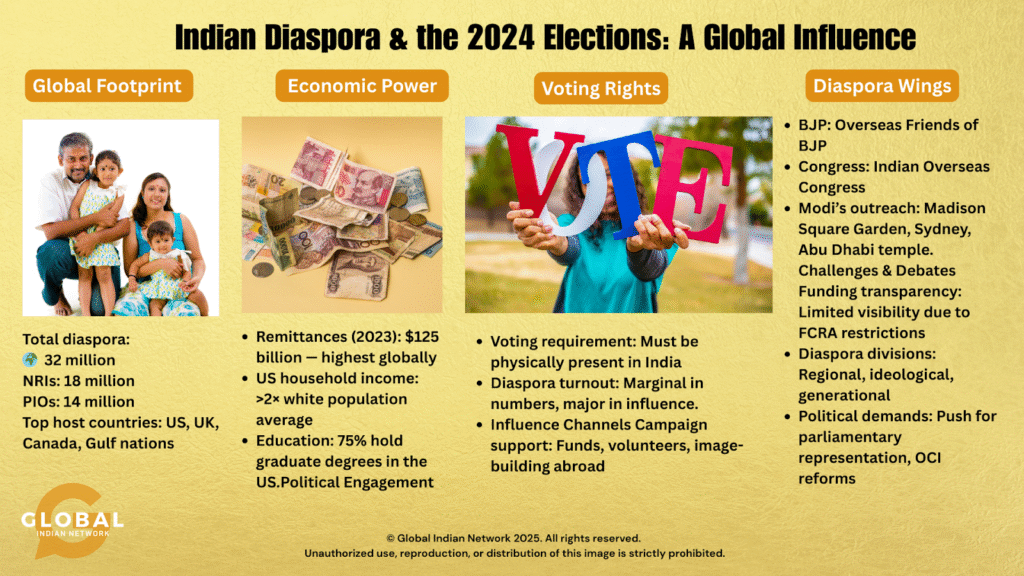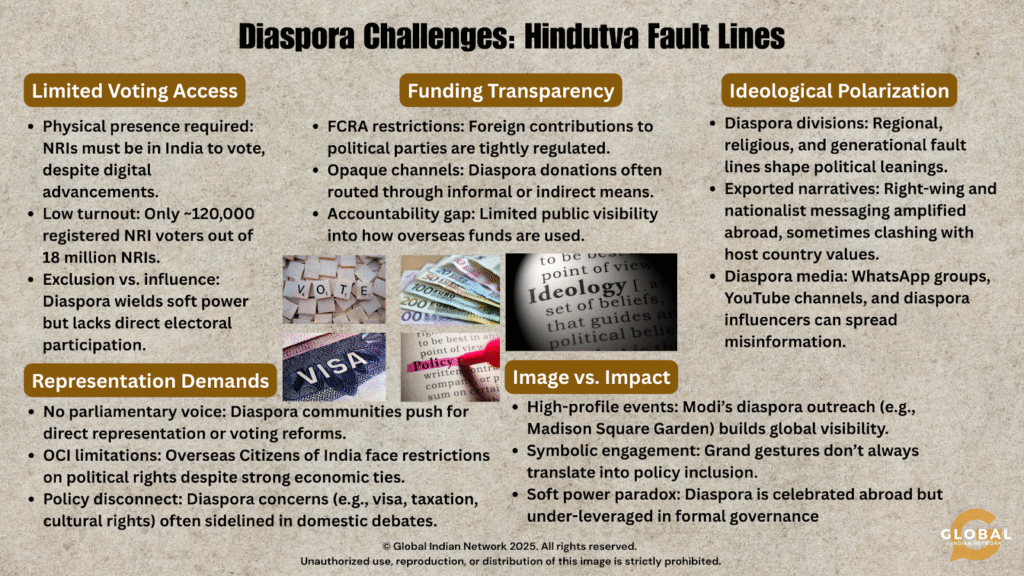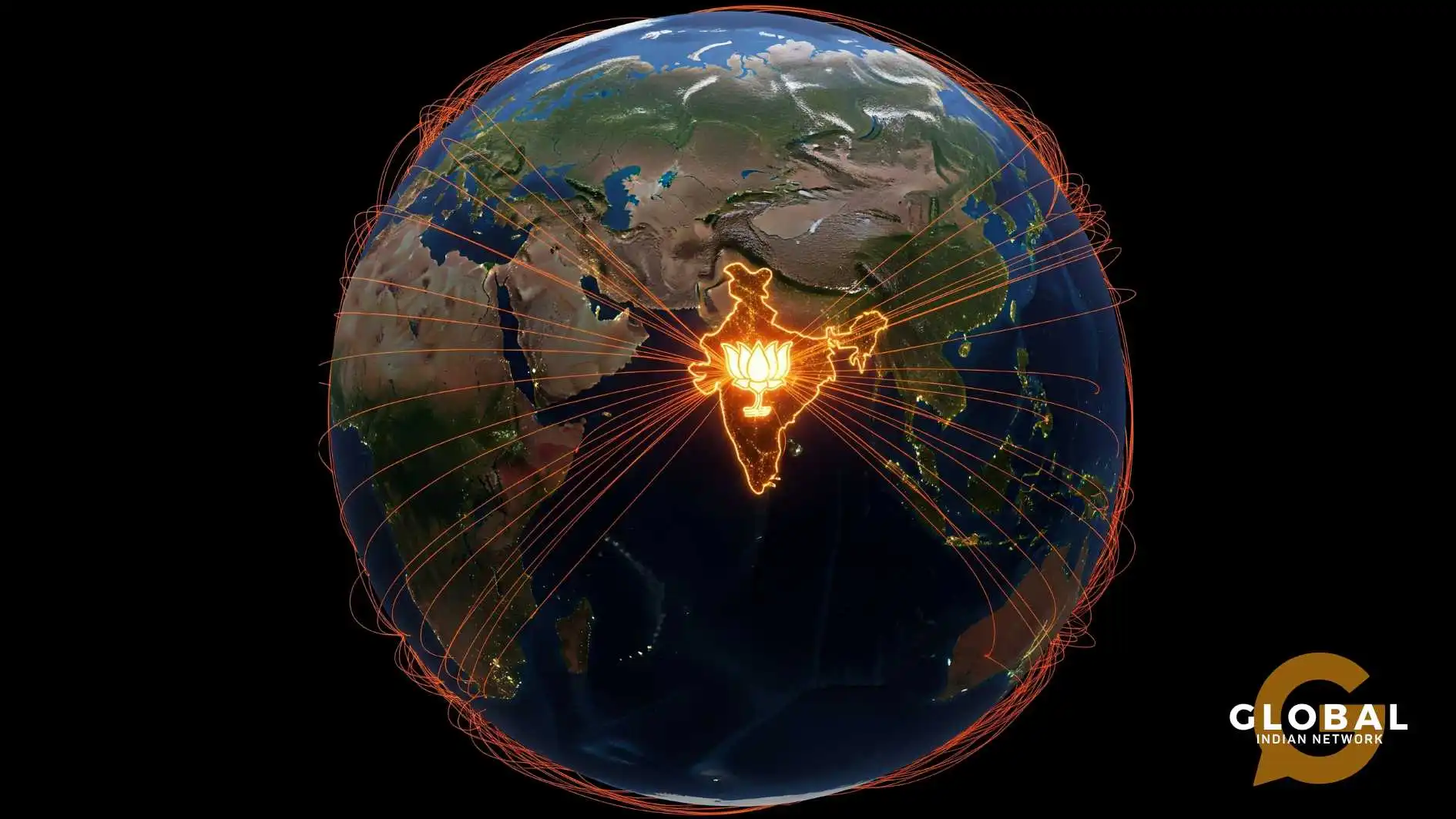In the bustling cities and quiet suburbs of the United States, the United Kingdom, and Canada, the Indian diaspora weaves its cultural tapestry with devotion, pride, and complexity. Yet beneath the surface of vibrant festivals and temple celebrations lies a powerful and polarizing current: the rising influence of Hindutva, a form of Hindu nationalism that transcends India’s borders. What began as a domestic political movement advocating Hindu cultural supremacy has blossomed into a potent identity force among expatriates, shaping how hundreds of thousands of Indian-origin individuals see themselves and engage with their adopted homelands.
This exportation of right-wing Indian politics is redefining diaspora identities, fueling communal tensions, and challenging multiculturalism’s core ideals abroad. As Hindutva’s reach extends beyond Bharat, questions arise about its impact on social cohesion and political discourse in democratic societies far from its birthplace—a phenomenon as complex and contested as the diaspora itself.
Let us sift the chaff and the grain within a broad framework for the good of all.
Table of Contents
Hindutva Abroad: Is the Indian Diaspora Exporting Polarised Politics?
The rise of Hindutva, a form of Hindu nationalism advocating Hindu cultural and political supremacy, is no longer confined within the borders of India. Its influence is increasingly evident among the Indian diaspora, particularly in Western countries like the United States, the United Kingdom, and Canada. This transnational spread of right-wing Indian politics has led to growing concerns over the exportation of polarized and exclusionary political ideologies that threaten pluralistic and multicultural societies abroad.

Roots of Hindutva and Its Rise in India
Hindutva is an ethno-religious ideology that has gained significant momentum in India over the past few decades, notably under the leadership of Prime Minister Narendra Modi and the Bharatiya Janata Party (BJP). At its core, Hindutva advocates for the political and cultural dominance of Hindus, often at the expense of religious minorities such as Muslims, Christians, Dalits, and others.
The ideology has led to systemic discrimination, restrictive laws targeting minorities, and regular episodes of communal violence within India. The consequences of this majoritarian politics are felt not only domestically but also globally, as the Indian government’s narratives and policies are mirrored among diaspora communities through networks linked to organizations like the Rashtriya Swayamsevak Sangh (RSS).

The Diaspora as a Conduit: The Challenges
For many Indian diaspora communities, Hindutva has become a potent identity marker—a means to affirm a Hindu-centric cultural nationalism in foreign lands. Diaspora organizations closely allied with Hindutva, such as the Vishva Hindu Parishad (VHP) and Hindu Swayamsevak Sangh (HSS), actively promote this ideology through cultural events, advocacy, and political lobbying. The diaspora’s increasing support for BJP-backed policies reflects a “long-distance nationalism” where political attitudes are shaped far from India’s socio-political realities but are infused with idealized notions of Hindu identity and homeland protection.
Diaspora Political Affiliations
In 2024, Indian diaspora groups held car rallies in over 20 US cities, showcasing their support for Prime Minister Narendra Modi’s potential third term, marking the culmination of three decades of the BJP’s diaspora outreach.

In countries with large Indian populations, these diaspora groups have begun adopting and adapting the political tactics and rhetoric of Hindutva advocacy. Events like the “Howdy Modi” rally in Houston in 2019, endorsed by prominent diaspora politicians, showcased the close ties between diaspora communities and Indian right-wing politics. The duality of identifying as politically liberal in host countries while supporting the Hindu nationalism agenda back in India reveals a complex transnational political identity that often sanctions exclusionary views abroad.
Demographic and Economic Clout
Indian Americans, about 1.5% of the U.S. population, are among the most educated and affluent groups. Nearly 80% hold bachelor’s degrees, with 30–40% holding graduate degrees. Their median household income is around $145,000, and they actively influence U.S. and Indian politics through civic engagement and diaspora diplomacy.
FCRA restrictions restrict foreign contributions to political parties, often through informal channels, and there is a lack of public visibility into the use of overseas funds.
Diaspora Voting Rights and Limitations
NRIs must physically be present in India to vote, as remote or online voting is currently unavailable. Consequently, despite the diaspora’s growing influence abroad, it lacks direct electoral participation in Indian elections.
India’s voting rights are restricted to registered NRIs, with only 120,000 registered in 2024, indicating a potential lower turnout. Despite this, diaspora groups maintain soft power through remittances, lobbying, and public demonstrations.

Diaspora Engagement Mapping
The EU’s diaspora engagement report indicates that India received $119.5 billion in remittances, accounting for 3.37% of its GDP, but lacks a formal policy, despite its significant economic and political contributions.
Ideological Polarization
Across borders and bloodlines, politics is rarely neutral—diaspora rifts, regional loyalties, faith traditions, and generational memory all leave their mark. Right-wing and nationalist messaging can clash with host country values, and diaspora media can spread misinformation.
Representation Demands
Diaspora communities in India face parliamentary voice issues, political rights restrictions, and policy disconnect due to strong economic ties, OCI limitations, and often sidelined concerns like visas, taxation, and cultural rights.
Image vs Impact
Modi’s diaspora outreach, like Madison Square Garden, enhances global visibility, but grand gestures don’t always lead to policy inclusion, and the diaspora is underutilized in formal governance.
Polarisation and Communal Tensions
One of the most worrying aspects of the diaspora export of Hindutva is the import of communal divisions and polarisation along Hindu-Muslim lines. These divisions manifest in several Western cities with large Indian communities, including London, Leicester, New Jersey, Toronto, and Vancouver. For example, Leicester in the UK has witnessed violent clashes rooted in Hindu-Muslim tensions fueled by diaspora politics. In the US, rising Islamophobia within some Indian-American groups has also been documented.
This polarisation is not accidental but deeply connected to Hindutva’s narrative, which often posits Muslim communities as the ‘other’ or a threat to Hindu cultural hegemony. Alliances with far-right groups in Western countries—groups that also share anti-Muslim and anti-immigrant sentiments—have amplified these fault lines. In the UK, Hindutva-aligned organizations have even supported political candidates espousing exclusionary agendas. Similarly, in the US, there has been concern about the Hindu diaspora‘s alignment with conservative politics, contributing to the rise of anti-Muslim rhetoric.
Socio-political Impact on Host Countries
The growing influence of Hindutva abroad complicates the multicultural fabric of Western societies, touted for their diversity and pluralism. Within diaspora communities, this has at times alienated secular Indians, religious minorities, and lower caste groups. The propagation of Hindutva’s majoritarian mindset abroad can fuel divisions not just within Indian diasporas but also in host societies, leading to broader intercommunal conflicts and social tensions.
Diaspora groups following Hindutva ideologies often assert a homogenized Hindu identity that overlooks caste diversity and internal inequalities, contributing to caste hierarchies being reproduced outside India as well. This endogamy and caste consciousness further fragment the community’s social cohesion.
The political mobilization around Hindutva in diaspora contexts also affects the political landscapes of host countries. It presents challenges for local governments and civil society in striking a balance between freedom of expression and religion, on the one hand, and the need to counter hate speech, communalism, and political interference from foreign influences, on the other.

International Dimensions and Challenges
The export of Hindutva raises critical questions about sovereignty and democracy. When diaspora groups aligned with Hindu nationalism support exclusionary policies and politics from their host countries, it challenges the foundational democratic ideals of equality and inclusion upheld by these societies.
Moreover, the entanglement of diaspora Hindutva with global far-right networks and Islamophobic ideologies reflects a broader trend of transnational right-wing populism. This coalition strengthens communal divides and encourages the spread of extremist narratives, complicating efforts to promote integration and social harmony worldwide.
International actors and governments face the delicate task of addressing these challenges without stereotyping or alienating diaspora populations as a whole. Awareness, dialogue, and coordinated policies are needed to confront ideological extremism while respecting democratic values.
The Way Forward
As the tapestry of Western multicultural societies increasingly feels the tensions wrought by diaspora politics, the nuanced challenge of maintaining social cohesion amid the rising influence of Hindutva arises. This fragmented weave challenges us to reflect on how pluralism can be preserved in the face of majoritarian narratives and the vigilance required to nurture inclusive, tolerant communities.

As Hindutva reverberates from India to Leicester, New Jersey, and Toronto, it becomes a global democratic challenge—one that demands a balance between cultural identity and respect for difference. The future of diaspora communities depends on rejecting narrow nationalism and embracing a shared humanity.
Let us resist the comfort of insularity and instead engage with the vast, interconnected realities that define our shared human experience. Join us to spread this universal and intergenerational message.









